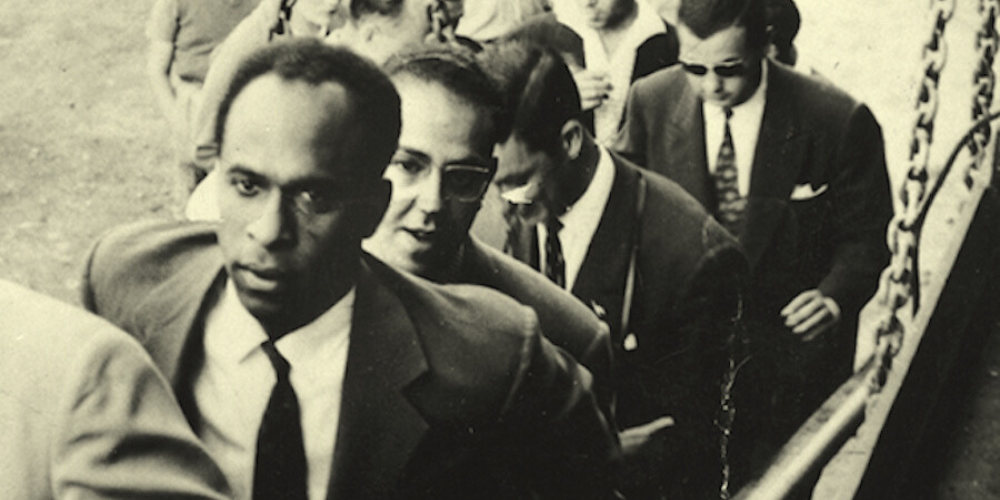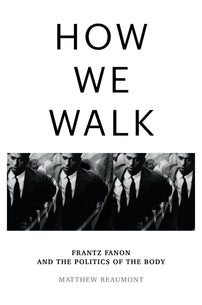How We Walk: a Letter from the Editor
How We Walk: Frantz Fanon and the Politics of the Body by Matthew Beaumont is one of our March Verso Book Club options.

What is it about walking, that simple everyday activity that we almost do without thinking, that is so complex? Why does it demand so much attention from thinkers, poets, philosophers and activists? On a personal level, there seems to be a profound connection between walking and the city, it is only by venturing out, and encountering the metropolis on foot, one gets to understand the place.
This is a layered encounter: firstly the distances between sites, then the history. One also starts to find out where one can and can’t go; what barriers one encounters: the flow of the crowd, the dead end streets, the fences and gates that bar your way. You discovered some places are safe, some are not. And where not to go at night. Walking then becomes a practise, a routine in your busy week. It is leisure or labour? An escape or the pursuit of what is to come? Finally, you discover that walking is an interior motion as much as it is a movement through space. It gets the heart pumping, but also it expresses in the stumble and gait of each step who you really are.
Over the last decade or so, I have worked with Matthew Beaumont on a trilogy of books on walking. It has been, as they say, a journey. Over the sequence of projects, Beaumont has taken this banal activity seriously and returned with profound insights. Nightwalking, was the thrilling history of London rambles that revealed what happens after dark: a perambulatory nocturne. The Walker, explores the works of an array of writers and their relationship to the literature of urban sauntering. From Charles Dickens to his own experience of the neoliberalism city, Beaumont charted how writers walked and wrote about wandering as a way of understanding the modern city. And one’s own self in the metropolis.
His latest book How We Walk, takes this theorisation to another level: that of the body. He choose one writer who could have been part of the previous book, Frantz Fanon, and expands a prospective chapter into a constellation of meditations on walking, embodiment, history and power. As Ato Sekyi-Otu notes Fanon is ‘a physician of the spirit and a poet of the body.’ Fanon is a writer of the body in motion (He used to dictate his work, pacing the room without cease).
Let us start from first principles: the body is the site of political struggle and, as Fanon say in The Wretched of the Earth: ‘What we want is to walk in the company of man, every man, night and day, for all times’. But this simple desire is not on offer to many of us. Beaumont contrasts this with the reality that Garnette Cadogan exposes in his 2015 essay, ‘Walking While Black’: ‘as a black adult, I am often returned to that moment in childhood when I’m just learning to walk. I am once again on high alert, vigilant’. The Black walker has to be vigilant of their surroundings, aware of dangers and potential violence.
‘The body,’ Fanon writes, ‘is surrounded by an atmosphere of certain uncertainty’. But this vigilance is not just sensitivity outwards to the environment, it has a profound impact on the body itself. Fanon claims that the Black body develops a defensive shell. Breathing becomes apprehensive. Even’s one’s stride becomes an ‘abject gait’. The tensions of the city – of modern life itself- are absorbed and reflected in the articulation of limbs, comportment, pace and composure.
The post colonial body is afflicted, but it is not alone, Beaumont argues. He also walks pace for face with Ernst Bloch, who claims that the oppressed working class will not be able to walk with ‘an upright posture’ until liberation. Bloch argued that an individual’s gait, in all its idiosyncrasies, can be regarded as a reliable guide to their relative state of social alienation or disalienation.
Fanon was also influenced by the medial work of Nikolaus Friedreich, who projected the body as an information system in which the connection between identity and the body is a feedback loop. Friedreich was fascinated by the phenomena of ataxia, a stiffness of the spine that caused poor balance, and a shuffling step. This informed Fanon’s explanation of the consequences when the Black identity is often defined by the body alone, forcing ‘a negating activity’, a self-protective response to the intolerable conditions of oppression.
In some cases this self protection takes the form of developing bodily armour, with which Beaumont splices together Fanon’s bodily thinking with the work of radical psychoanalyst, Wilheilm Reich. This could be examined in the rhythm of the gait and in what the body holds back: ‘pulled back shoulders, thrust-out chest, rigid chin, superficial, suppressed breathing.’ For Fanon, this could be found in the colonised body that was ‘always tense’.
Fanon would continue to say that the same seized up body ‘is always ready to change his role as game for that of hunter’. This is reflected in the life of the ‘Algerian woman’ in the midst of the war of liberation. Until this time the female body was expected to be a certain way, but now was asked to shape shift and walk in new ways in the pursuit of freedom. The Algerian feminist activist and novelist Assia Djebar talks of taking off the veil for revolutionary garb, and how this itself becomes a kind of armour against the city. This tension cannot be resolved by the colonial struggle alone.
What is desired here, through Beaumont’s intellectual explorations, is the ability for everybody (every body) to be able to walk freely, upright, without stiffness or precaution through the city. This is a profound wish, and not a small one. In order for that to happen, everything else has to change. What Fanon calls ‘orthopaedic politics’, the excavation of how we put one foot in front of the other, is in fact a recipe to change the world.
I hope that you enjoy this thought provoking book.
Leo Hollis, Editorial Director
London, September 2023
How We Walk: Frantz Fanon and the Politics of the Body by Matthew Beaumont is one of our March Verso Book Club options. Learn more about the Verso Book Club.
[book-strip index="1" style="buy"]
